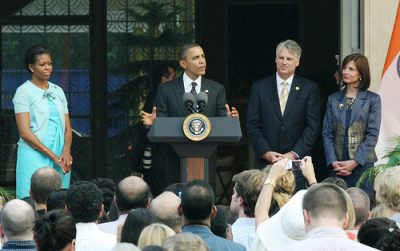Yet the perceived underlying weakness of the US economy, as highlighted by fears of a new wave of housing foreclosures that will deflate both asset prices and consumer confidence in the United States, creates major economic uncertainties for Asian economies that are reliant on US consumers to drive exports that are still a fundamental piece of the Asian economic recovery puzzle.
The administration’s message to Asian partners in the run-up to the president’s trip has been focused on its commitment to trade and economic engagement—a welcome sign amidst fears of rising US protectionism as embodied by campaign rhetoric in a wide variety of congressional races. But even that message of economic openness has been couched in language about increasing US exports and curbs on current account imbalances, which can only reasonably be achieved by an increase in US savings at the expense of US import consumption. Nevertheless, to the extent the president and his cabinet can manage fears that the United States is about to embark on predatory monetary policies and avoid the worst instincts to close its markets to foreign competition, Asians will be at least minimally comforted that the rug will not be completely pulled from under them.
The China Factor
Chinese analysts are hard-pressed not to read the president’s circuitous amble through Asia’s biggest democracies through a prism of worry about American encirclement intentions. The administration has taken pains to reassure Beijing that not every US action in Asia is uniquely directed at China, but Beijing’s worries will persist. Those concerns will be exacerbated by China-directed criticisms at the G20 about the slow pace of RMB appreciation and by new concerns over China’s restriction of rare earth element exports.
Despite these fears, the United States and China are actively pursuing policies designed to ratchet down bilateral tensions that increasingly alarm the region. These policies include efforts to shift the focus of attention in disputes over currency valuation to concerns over global current account balances. China’s current account surplus is generally recognised in China as a source of destabilising inflation and a liability in multilateral relationships, so focusing on the domestic and multilateral benefits of reducing its global current account surplus may deflect domestic public pressures to resist raw US pressures on the RMB valuation. With the Congress seemingly prepared to put off further legislative action on Chinese currency, the administration’s new strategy may provide time enough to engineer a face-saving means for China to put in place policies to further correct its currency misalignment in ways that ease global imbalances and promote overall global growth.
Charles W. Freeman III holds the Freeman Chair in China Studies at the Center for Strategic and International Studies in Washington, D.C.
This article was first published here at CogitAsia.

